Race smarter: Olympic journaling strategies for mountain biking competitions
Harness the power of reflection to boost your MTB race-day performance
I have written several posts about using reflection when trying to get better at learning mountain biking skills. All of them have focused on practicing.
But what about performance, like competing in an MTB XC, Enduro, or DH race?
During this year’s Summer Olympics in Paris, I stumbled across three articles about how some Olympians use journals to record their written reflections before, during, and after their events.
It’s been over a few years since I’ve raced XC and Enduro (see five photos of me below in Footnote #1), but I’m guessing that more than a few of you are regular racers. This post is for you.
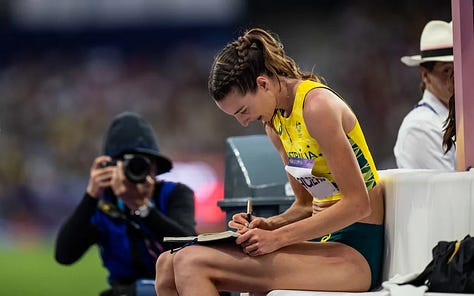
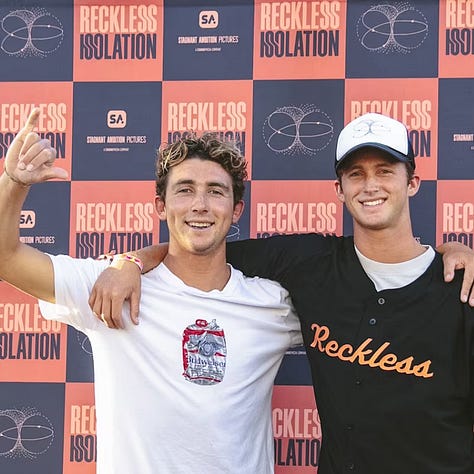
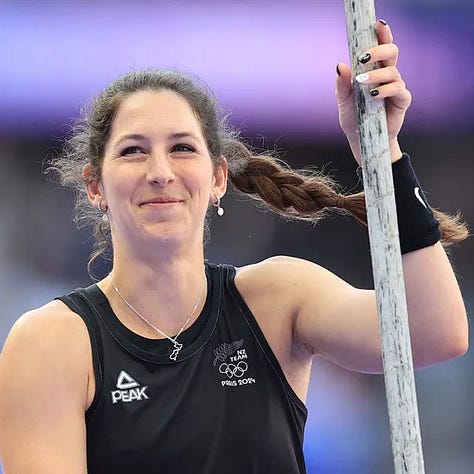
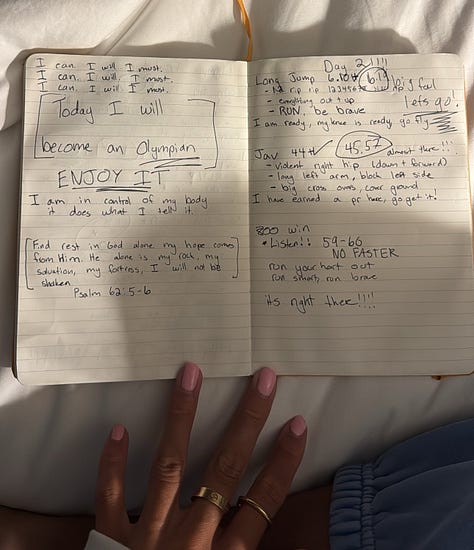

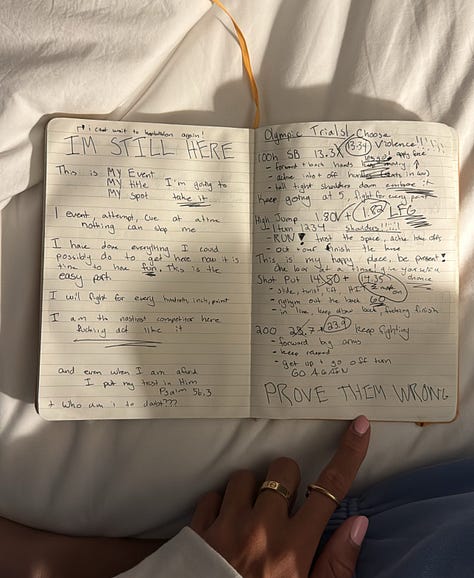
Athletes who are profiled or mentioned in the articles below include:
Griffin and Crosby Colapinto, surfing
Anna Hall, heptathlon (seven track and field disciplines)
Cole Houshmand, surfer
Zharnel Hughes, sprinter
Eliza McCartney, pole vault
Alysha Newman, pole vault
Nicola Olyslagers, high jump
Articles:
Radio New Zealand:
What are Olympians like Eliza McCartney (pole vault) writing in their journals during events? (The article also mentions Alysha Newman, pole vaulter, and Nicola Olyslagers, high jumper.)
Olympics.com:
The power of the journal: Olympians' secret to success (The article features Nicola Olyslagers, high jumper; Anna Hall, heptathlete; Zharnel Hughes, sprinter; and brothers Griffin and Crosby Colapinto, surfers)
Teenage bets, tough love, journaling, and a whole lot of mutual respect “The crew that journals together, wins together.” (Features brothers Griffin and Crosby Colapinto, and Cole Houshmand, all surfers)
Memorable quotes
Griffin Colapinto, surfer:
“The journal, I bring it everywhere because it's almost like an outlet. Whenever I feel like I'm a little bit off or something's on my mind, I write it down and I feel way better after because I'm getting it out of my head. Writing it on paper, just being able to do that, makes me feel a lot lighter and I'm kind of releasing all that anxiousness or all those thoughts that don't really serve me.”
Crosby Colapinto, surfer:
“After losing first heat in Portugal I felt like I was slowly watching my opportunity to qualify slip through my fingers. Having so many negative thoughts coming into my mind and just having to realize that those thoughts will always come, it just matters how I am handling those thoughts. So I better learn to get good at dealing with those thoughts, because they will always be coming and going throughout my career.”
Cole Houshmand, surfer:
“A lot of it [journaling] is coming from Griffin Crosby because Griffin's almost like the ringleader of our crew. He's the one who's been doing it for a while and he's telling us the right things to do. And I feel like our whole crew is on that same trajectory of trying to better themselves and journal and just be the best person that they can be."
Eliza McCartney, pole vaulter:
“Mostly I'm taking technical notes because I forget immediately what I just did. So I'm writing things like what pole I used, what my grip was, how far back my run-up was, what my uprights were on—all the fiddly technical information. And then [I include] what I felt in that jump, because [although] I can watch the videos back, I want to know, actually, what did I feel at the time? Then we go back and analyze it. We do a lot of this. I get it out of my head, I write it on paper [and] I don't have to remember it.”
Nicola Olyslagers, high jumper
“The notebook is my training diary and my sport psych and I came up with it to bring it into the competition just so I know which areas I did really well in and which areas I need to work on. Once I write it down, it’s like as soon as it is on a piece of paper you don’t have to put it into your mind and can just think about other things. The process is more powerful than what is actually on the piece of paper because it gives me that stage where I could have just jumped the world record or missed my first attempt at my starting height, it’s the same process.”
Performance journaling: rationale and strategies (quotes from coaches and journalists)
“It's awesome to see that they're doing that [journaling]. It's quite interesting that this is one of the first times it's been on show. A lot of thinking goes on in the moment that doesn't necessarily get documented, so after the fact it's really hard to draw on that in an accurate way. To write that down and use it as a retrospective tool can be really powerful. You're just going to see more and more of it.”
“Olyslagers’ post-jump ritual involves noting down technical advice, motivational quotes, and personal reflections after each jump.”
“Writing each time she jumped a bar allowed Nicola to zone off and go, ‘What do I need to work on?’ rather than get carried away by the emotion.”
“This practice not only helps her concentrate on the technical aspects of her jumps but also serves as a mental reset, enabling her to manage the highs and lows of competition.”
“The green notebook was back on track with Olyslagers when she won silver earlier this week. In it, she gives herself ratings out of 10 for each component of the jump, along with motivational quotes and - Olyslagers is a devout Christian - Bible verses.”
“These affirmations are not just words; they are Hall’s mental armor. They help her stay present and focused on the task at hand, blocking out any distractions and pressures. They remind her that confidence comes from preparation and that it’s essential to enjoy the journey.”
“Her coach noted that these journaling practices were crucial in maintaining her mental clarity and competitive spirit despite facing the significant hurdle of the surgery in an Olympic year.”
Start small
These athletes and coaches show us that journaling isn't about recording events—it's about unlocking potential, overcoming mental barriers, and fine-tuning performance.
By bringing this practice into your mountain biking race routine, you’re not just racing against the clock or the competition; you’re racing against your own limits and striving to surpass them.
As you gear up for your next race, consider adding a pen to your toolkit alongside your helmet and hydration pack. Start small: jot down your pre-race thoughts, scribble mid-race observations during breaks, and carve out time for post-race reflection. You might be surprised at the insights you uncover and the improvements you make.





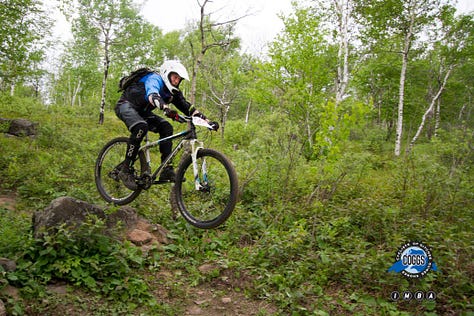
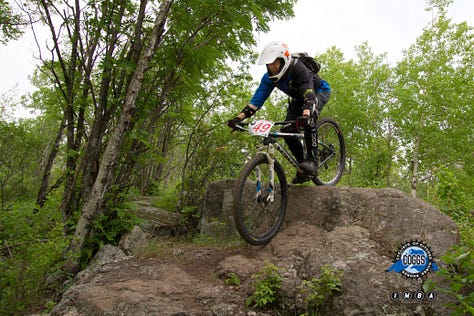

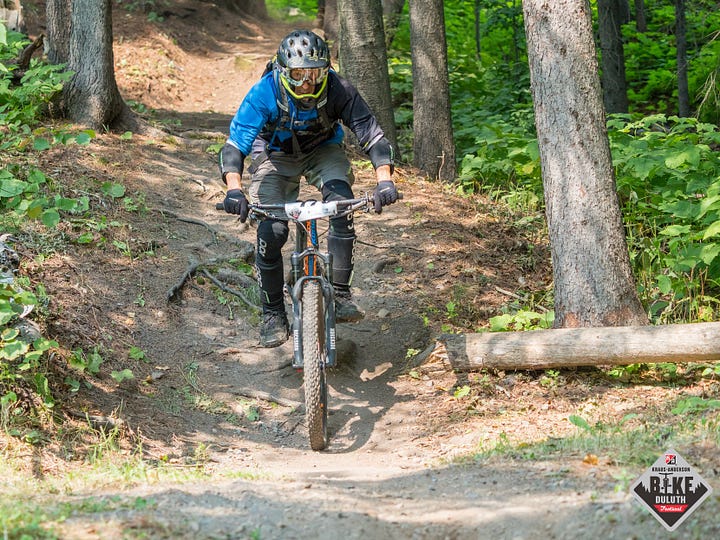
nice sharing. could you call me sometime? linus langer 507-301-1788